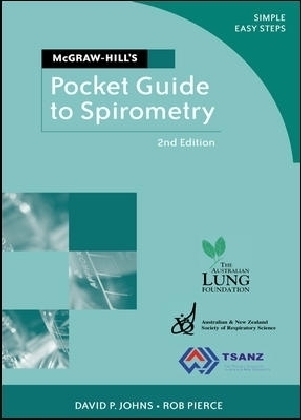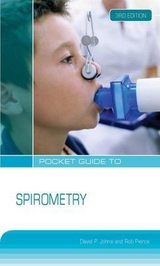
Pocket Guide to Spirometry
McGraw-Hill Medical (Verlag)
978-0-07-013464-5 (ISBN)
- Titel erscheint in neuer Auflage
- Artikel merken
"The Pocket Guide to Spirometry, 2e" is an invaluable guide for medical practitioners and health professionals involved in the performance and interpretation of spirometry. Spirometry is the most commonly used method for assessing lung function. It is one of the primary tools used for the diagnosis, assessment and management of many respiratory diseases including asthma and COPD. Growing worldwide incidence of asthma and COPD as a major ongoing condition means spirometry is of high relevance to a broad range of health professionals. This handbook covers essentials facts about spirometry including what it is and how it can be used effectively, how the test is performed and interpreted, different types of spirometers and some common pitfalls and problems.
Features new to this edition include: updating throughout to align with new international standards as the European ERS 1993 and American ATS 1995 have been merged; alignment with current terminology and practice, particularly on predicted values; new lung function reference tables with lower limits of normal providing more accurate parameters for decision making, and new tables for children and adolescents; coverage of new index of spirometry based on a six second expiration; and, reference to an online spirometry buyer's guide for currency with equipment and manufacturing details.
David P. Johns is Conjoint Associate Professor and consultant in Clinical respiratory science at the University of Tasmania and the Royal Hobart Hospital. Rob Pierce is Professor of Respiratory Medicine at the University of Melbourne and Director of the Institute for Breathing and Sleep and Director of the Department of Respiratory and Sleep Medicine at Austin Hospital, Victoria, Australia.
ForewordPrefaceAcknowledgmentsIntroductionPART 1Chapter 1 What is spirometry and what are its uses?The function of the lung and lung function testsIndications for spirometryComplications and contraindicationsSummaryChapter 2 Measurement of ventilatory functionThe spirogramIndices based on 6-second forced expirationInspiratory capacityThe flow-volume curve or loopSummaryChapter 3 Measurement devicesVolume-displacement spirometersFlow spirometersMonitoring devices and peak flow metersCalibration and quality controlFactors to consider when choosing a spirometerSummaryChapter 4 How to do spirometry and the common problemsHow to do spirometryMeasurements in young childrenAcceptability criteriaBack-extrapolationPatient-related problemsInstrument-related problemsPerforming spirometry in the busy clinical practiceSummaryPART 2Chapter 5 Infection ControlCross-infection and lung function testingReducing the risk of cross-infectionSummaryChapter 6 Predicted normal valuesNormal valuesSelecting the most appropriate normal valuesSummaryPART 3Chapter 7 Interpretation of ventilatory function testsSignificant change in spirometry with timeClassifying abnormal ventilatory functionGrading severity of a ventilatory defectMeasuring reversibility of airflow obstructionAirway provocation testingPeak flow monitoringChoosing the appropriate testSummaryChapter 8 Case historiesCase 1Case 2Case 3Case 4Case 5Case 6Case 7Case 8Case 9Case 10SummaryPART 4Chapter 9 Mechanics of breathingGas flow through the airways-how airflow is producedPatterns of airflow in the human airwaysThe phenomenon of maximal airflow limitationTheories of airflow obstructionHow pulmonary disease affects airflowSummaryChapter 10 SummaryAppendix A Equipment standards and validation proceduresAppendix B Correction of volume and flow to BTPSAppendix C Predicted normal valuesGlossaryReferences and further readingUseful websitesIndex
| Zusatzinfo | ill |
|---|---|
| Verlagsort | New York |
| Sprache | englisch |
| Maße | 44 x 70 mm |
| Themenwelt | Medizinische Fachgebiete ► Innere Medizin ► Pneumologie |
| Studium ► 2. Studienabschnitt (Klinik) ► Anamnese / Körperliche Untersuchung | |
| ISBN-10 | 0-07-013464-2 / 0070134642 |
| ISBN-13 | 978-0-07-013464-5 / 9780070134645 |
| Zustand | Neuware |
| Haben Sie eine Frage zum Produkt? |
aus dem Bereich



